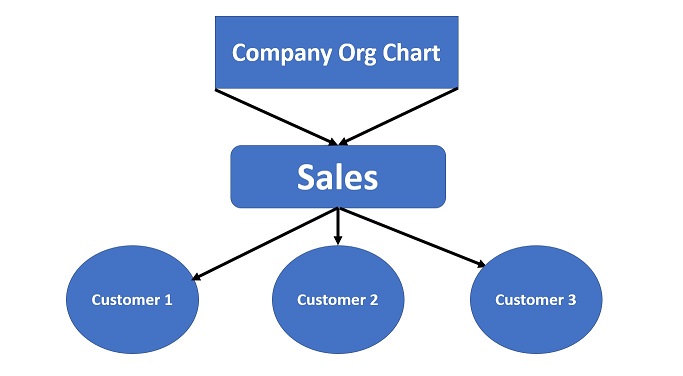Salespeople fulfill the critical role as the quarterback of their company
During sales training workshops, I like to bring new and unique views of our role as salespeople. One view that really brings a unique perspective is the concept of the quarterback on a football team.
The approach used to explain this concept is better understood with the modified company organization chart below.
I’ll ask the training group if their company has an org chart, which of course everyone nods yes.
Then, I ask them a follow-up question. “Where would you put the customer on the company organization chart?”
This draws a bevy of strange looks. A few people try to guess…. “at the bottom…. off to the side”. The guesses continue for a bit before I show the company org chart with the entire company at the top. As you can see, it is 100% focused or funneled down to the salesperson, which then funnels to their customers. This is one of the main reasons I like to tell people to go into sales. Everything and everyone in the company is designed to support you in your role of serving customers.

When you truly think about the purpose of your company and economic driver of your company, everything focuses on acquiring and serving the customer. They provide 100% of the revenue which pays for everything your company does. From the board to the CEO to the department and regional managers…..from the accounting department to the customer service teams to the lawn crew, and even the office cleaning service. Everything is paid for by a sale to a customer. And the person responsible for connecting that paying customer to your company is you, the salesperson.
As the salesperson, just like a quarterback, it is your role to assess the field of play quickly and then deploy your best sales approach. You don’t do all the roles, nor do you have to be the only one who interacts with the customer. Several on the team will interact directly with the customer at various times: customer service, accounting, and freight departments, etc.
As the salesperson, we are there to make sure we interface our company with the customer’s company in the best way possible. The goal is to bring all these resources based on our strengths, the customer’s needs, and against a growing list of competitors.
Think about your absolute favorite or highest performing quarterback. For some, it might be Roger Staubach or Fran Tarkenton. For those younger, it might be Joe Montana or Dan Marino. In recent times, it might be Tom Brady or Peyton Manning.
Whoever you see, it doesn’t matter as each of them brought their unique set of strengths to each game against each competitor differently. They weren’t general managers trying to hire players. They weren’t head coaches on the sidelines dealing with a multitude of tasks to include both offense and defense leadership. They also weren’t on the field doing someone else’s job.
They were on the field, leading their team with the responsibility of coordinating their personal strengths along with their team’s strengths against the team in front of them that day.
Roger and Fran were great scramblers. They escaped the pocket frequently and scrambled to find an open receiver. The others mentioned above weren’t as capable, as the game had become too fast for scrambling. So, they were more talented at reading the defense and getting the ball out of their hands faster. There are also those quarterbacks who are great at running. They seem to do well for a short time but don’t last long enough to become long-term legends. However, they win games by using their legs, which is their strength.
You are the same. You have strengths. It might be technical product knowledge and implementation. Great! It might be operational or distribution knowledge and implementation. Again, great!
My recommendation to you as a salesperson is to, “Bring it!”. Bring those strengths to your customers and help them make money with them.
Now look to your company. What are their strengths right now? How can I, as the quarterback, employ those strengths against my competition to bring the most value to my customers? Many salespeople bemoan the lack of some ability their company has. “We have a terrible invoicing/accounting system. We can’t deliver more than 20 miles from the retail facility. The competition is giving product away and killing our margins.” You name it, and we’ve heard it all. Most of us, including myself, have even said it ourselves.
Did it do any good? Of course not.
Success comes from this quarterback concept. Progress came when I realized it was my role to bring strengths (mine and my company’s) to meet the needs and wants of my customers against the most likely competitor in the market.
Start today with a few steps:
- Make a list of your top strengths and weaknesses.
- Make a list of your company’s top strengths and weaknesses.
- Do the same for your competitors who sell to your top third customers. Many call them their A customers.
- Review this information with your sales manager, your top selling peers, and any department mentioned in those lists.
- Start small and develop easy methods of expanding the collective strengths and mitigating the collective weaknesses.
The key to all of this is to view your role as the quarterback who is on the field of play to implement the game strategy.
What about when others on your team aren’t doing their job to your satisfaction? This is a dilemma for many salespeople.
Let’s go back to our quarterback analogy. I’m guessing it hurts when a 350-pound defensive lineman sacks a quarterback. I’m sure it’s easy to blame your lineman for not blocking, your receivers for not getting open fast enough, or anyone for not running the play correctly. Yes, they probably did perform poorly, and you paid the physical pain for their poor performance. In sales, this is going to happen in your life as well. Someone in your company is going to perform poorly, and you will pay for it. Customer service will upset a customer. A driver will deliver to the wrong location. While not as physically painful as a lineman sacking a quarterback, you will suffer the financial pain of no commission and no revenue for the company.
It would be too naive to say, “Don’t scream and blame,” as I certainly felt this pain many times and became fairly upset. I also matured to understand it was my role to fix it so we didn’t repeat the same errors. Watch the greats like Manning, Rodgers, and Brady. They too, lost their tempers and had moments when they blamed. However, they also went over to the sidelines and reviewed the plays to determine the best way to win! They calmed down and realized they were the quarterback. They had to bring their strengths and mitigate their weaknesses based on the team they had that day.
Best of luck in your sales success and enjoy your role as the quarterback of your company!


